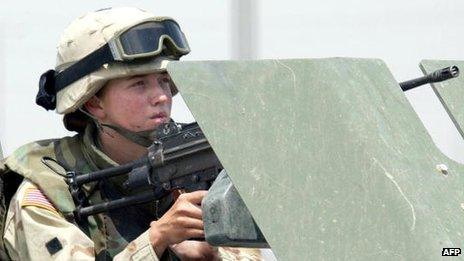Marines to train women for combat
- Published

The US Marines have announced plans to start training women for combat. Will they be able to silence the doubters who question their battlefield strength and stamina?
The roles open to women in the US military are slowly expanding, as the result of a review ordered by Congress and stemming from lessons learned from the wars in Iraq and Afghanistan.
In February of this year, the Pentagon announced women would formally be allowed to serve closer to the front lines in positions such as medics, tank mechanics and radio operators - jobs that many women were already performing in a loop-hole arrangement when "attached" to a battalion.
The February decision did not actually permit women to serve in combat roles.
That is about to change.
'Good faith' questions
The <link> <caption>Marine Corps Times</caption> <url href="http://bit.ly/HR0b5p" platform="highweb"/> </link> reported this week that the school that trains infantry combat officers for the Marines is looking for female volunteers.
The as-yet undetermined number of women selected will join their male counterparts on the course, taught at the sprawling United States Marine Corps (USMC) base in Quantico, Virginia.
Only officers will be able to participate, but Assistant Commandant Gen Joseph Dunford has said that soon enlisted women will be able to opt for infantry training.
One question often raised in discussions regarding total equality between the sexes on the battlefield is strength and stamina. Can women perform the same duties as men, for the same amount of time while carrying the same amount of equipment?
Currently the annual physical fitness tests for men and women in the Marine Corps are gender-based.
For example, women must be able to perform a different type of pull-up called a "flexed-arm hang", while men must be able to perform a set number of fully executed pull-ups to pass the exam.
The Marines is also the only branch of the US military where men and women undergo separate basic training.
However, in many ways Marine training already places the "focus on tasks, not on physical standards", said Greg Jacob, a former USMC captain. Capt Jacob went through both the enlisted and officer infantry training schools in his 10 years in the Marine Corps
"The concern would be that this has to be done in good faith," said Capt Jacob, about the defence department's decision to open up more positions to women. "The Navy did this essentially in the early 90s to prove women couldn't be fighter pilots.
"It's great that the Marines are doing this," he said. "They don't really like change but once they begin to change, they do it flawlessly."
Internal tension
Capt Jacob also said he felt the adjustment to women in infantry combat roles would really be a case of the men serving with them accepting them as equals, as he felt any woman qualified to enter the training would have little trouble in performing to the same level as her male counterpart.
A Marine Staff Sergeant who asked to not be named said: "If you are a US Marine who happens to be female, and you can carry it and shoot it and hack it - to me you are just another Marine.
"I have no problem taking orders from women who conduct themselves as Marines. But I know guys who don't feel this way, mainly in a battlefield sense."
According to Anu Bhagwati, a former Marine Corps captain and executive director of the Service Women's Action Network, this is an exciting development. But the results will depend on the intentions of everyone involved, she said.
"We cannot have any tolerance for abuse, harassment, or hazing of female volunteers," Capt Bhagwati said.
"In the past, the services have opened positions and schools up to women as experiments or pilot programmes and all too often they have deliberately set the volunteers up for failure in order to prove their foregone conclusions that women were not qualified to serve in combat arms, or should not serve.
"As proven by 10 years of leading troops in combat in Iraq and Afghanistan, there are women that are physically and mentally qualified to succeed at IOC, and lead infantry platoons," she said.
While so often in-step with its American counterpart, the UK military is not yet ready to formally accept women in combat roles.
"The vast majority of roles in the Armed Forces are open to women and hundreds of servicewomen are currently serving their country with distinction in Afghanistan," a spokesman for the Ministry of Defence said.
"Comprehensive review into the exclusion of women from ground close-combat roles concluded that there should be no changes to the existing policy.
"There are no plans for a further immediate review."
This small but potentially pivotal new opportunity for women will play out within the Marine Corps, but the results will be used to shape future recommendations made by the US defence department to the government.
Women currently account for about 15% of active duty military personnel. Over a quarter of a million women have deployed to Iraq and Afghanistan.